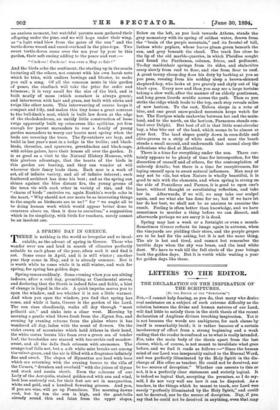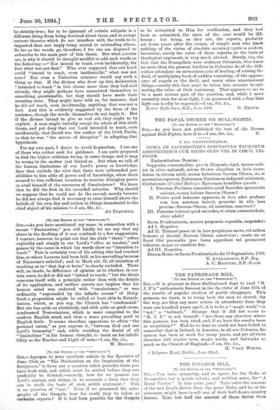LETTERS TO THE EDITOR.
THE DECLARATION ON THE INSPIRATION OF THE SCRIPTURES.
ITO THE EDITOR OF THE " SPECTA.TOR:1 Sin,—I cannot help fearing, as you do, that many whe desire- real assistance on a subject of such extreme difficulty as the relation between the divine and human natures of our Lord, will find little to satisfy them in the sixth thesis of the recent declaration of Anglican divines touching inspiration. Yet it is not because the words are ambiguous, for each clause by- itself is remarkably lucid ; it is rather because of a certain. incoherency of effect from a strong beginning and a weak ending that the reader is confused as to what is really intended.. For, take the main body of the thesis apart from the last, clause, which, of course, is not meant to invalidate what goes. before, and we find it reads as follows :--" Since the human mind of our Lord was inseparably united to the Eternal Word,- and was perfectly illuminated by the Holy Spirit in the dis- charge of His office as teacher, He could not be deceived, nor be the source of deception." Whether one assents to this or- not, it is a perfectly clear statement and strictly logical. It is indeed so logical that, accepting the premises, as I do my- self, I do not very well see how it can be disputed. As a teacher, in the things which he meant to teach, our Lord was surely "perfectly illuminated by the Holy Spirit," and could, not be deceived, nor be the source of deception. Nay, if you say that he could not be deceived in anything, even that may 'be [staidly true; for to be ignorant of certain subjects is a -different thing from being deceived about them, and to accept -current theories which do not interfere with the truth to be imparted does not imply being misled or misleading others. So far as the words go, therefore, I for one am disposed to subscribe to the main part of this thesis. But what puzzles -me, is why it should be thought needful to add such words as the following :—" Nor intend to teach, even incidentally, for fact what was not fact." Who ever supposed that our Lord -could "intend to teach, even incidentally," what was not true P Not even a Unitarian minister would say such a thing as that. If the divines who drew up this declaration 4` intended to teach" in this clause more than they had said already, they might perhaps have committed themselves to something questionable, but they should have made their meaning clear. They might have told us, for instance, that he dead not teach, even incidentally, anything that was not a fact. And this is evidently suggested by the form of the sentence, though the words themselves do not imply it. But if the divines intend to give us real aid, they ought to be explicit. A man might verbally accept the whole of this sixth thesis, and yet deny that our Lord intended to teach, even -incidentally, that David was the author of the 110th Psalm, -or that he was " the source of deception " in adopting that hypothesis.
For my own part, I desire to avoid dogmatism. I am one -of those who rather seek for guidance. I am quite prepared to find the higher criticism wrong in some things, and it may be wrong in the matter just hinted at. But when we talk of the human limitations of our Lord's power or knowledge, does that exclude the view that there were unbounded pos- -sibilities to him alike of power and of knowledge, when there seemed to him sufficient occasion to exercise Almighty power -or avail himself of the resources of Omniscience P We know -that he did the first in his recorded miracles. Why should we suppose that he could not do the second, merely because -he did not always find it necessary to raise himself above the beliefs of his own day and nation in things immaterial to the chief objeet of his mission P—I am, Sir, &c., AN INQUIRER.



















































 Previous page
Previous page